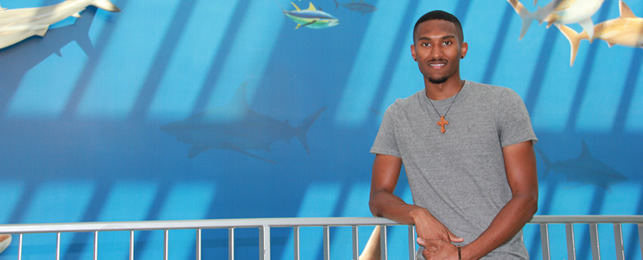
Summer Research Internship Completes the Circle of Learning for Neuroscience Student
Working in a laboratory to study the science behind a neurological disorder was a dream internship for Ezana Assefa, an NSU junior who participated in the 2015 Summer Undergraduate Research Experience (SURE) at Washington State University in Pullman, Washington.
With a passion for neuroscience and research, Assefa is double-majoring in behavioral neuroscience at the College of Psychology and biology at the Halmos College of Natural Sciences and Oceanography. Combining his studies in these related disciplines, he plans to pursue a career as a neurologist or neurosurgeon.
Designed to give undergraduate students hands-on experience and the chance to participate in ongoing research programs, the SURE program put Assefa in a laboratory full time. There, he studied specific proteins/enzymes that are necessary to prevent symptoms of Kabuki syndrome, a neurodevelopmental disorder marked by fine motor deficits, intellectual development delays, and physical facial abnormalities.
At the end of the eight-week program, he presented his research in a poster titled "Motor Coordination Deficits and Altered Gene Expression in Kdm6a Knockout Mice."
"I was working in the lab studying the epigenetic regulation of motor-related genes in mice in hopes of applying any findings to the understanding of neuro-developmental disorders in humans," said Assefa, whose studies in behavioral neuroscience sparked an interest in research.
"I was intrigued by the concept of taking an idea and then testing a hypothesis," he said. "It's very mentally stimulating. I would like to continue research in the biological aspects of neuroscience, which is what I love."
Assefa is participating in additional research projects with Jaime Tartar, Ph.D., associate professor, and Jonathan Banks, Ph.D., assistant professor, at the College of Psychology.
"We are examining the effect of acute stress on measures of cognition," Tartar said. "Ezana's role in this project is to examine how variations in a gene called 'COMT' can explain individual differences in cognitive performances after stress."
In addition, Assefa will work as a paid research assistant to Tartar on a grant-funded project in which he'll study genetic and immune changes that occur with sleep loss.
In 2014, Assefa participated in an internship at the University of Vermont where he studied the effects of exercise on stress and anxiety. In April 2015, he presented his work at the third annual Life Sciences South Florida (LSSF) 2015 STEM Undergraduate Research Symposium in Port St. Lucie, Florida.
Research internships provide students in neuroscience with real-world learning experience.
"An internship like this allows one to begin to understand how research is conducted to advance our understanding of science," said James Munoz, Ph.D., assistant professor at the Halmos College of Natural Sciences and Oceanography who attended Assefa's poster presentation at the SURE program.
"Learning in the classroom is largely limited to conceptual learning. This internship allowed Ezana to apply these concepts to hypothesis-driven experiments to advance our understanding of science. Everything discussed in science classrooms once started out as hypothesis-driven experiments, but new findings can take years to find their way into textbooks.
"Presentations are important because they teach one how to effectively communicate science. A scientist must be able to effectively communicate to other scientists the rationale of the experiment, how they conducted it, what they observed, and how those results advance our understanding of science. Just as important, a scientist must be able to effectively explain the challenges and importance of their research to non-scientists, as budgets and policies are normally not controlled by scientists."
As Assefa explained, "I feel like I learned so much that I could not have learned on my own or in a classroom. This experience taught me in a very different way that will stick with me. It has given me a better idea of what graduate school might entail, and it has greatly supplemented my classroom learning by helping me understand the process behind the research.
"It's one thing going over a slide and listening to a lecture versus actually doing the work…It completed the circle for me."